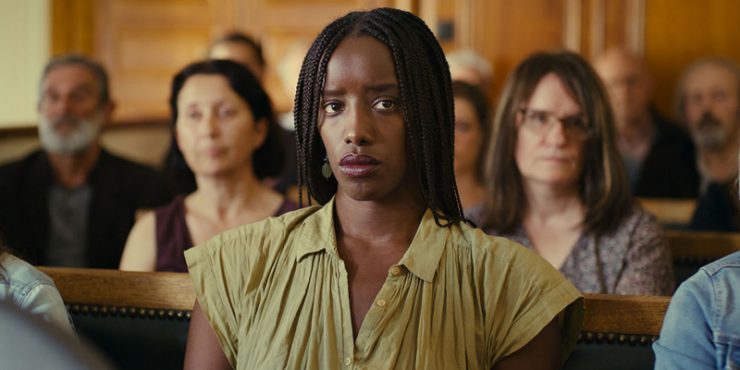The story of Medea, the sorceress from Greek mythology, is of a spurned woman who killed her children. On paper, this sounds like the worst crime imaginable. As the title character in Euripedes’ most famous play, she evolves from a monster into a complicated anti-hero, a criminal formed by the mistreatment of her husband, Jason, and the patriarchal society (even in the heavens!) that allowed him to do so. There’s a reason why this story endures. In Saint Omer, Rama (Kayije Kagame), a Senegalese writer living in Paris, travels to the small town of Saint-Omer to sit in on a trial of a fellow Senegalese woman named Laurence (Guslagie Malanga). She is accused of murdering her baby, of laying it down on the beach and allowing the tide to swallow it up. Rama thinks she could turn Laurence’s trial into a modern day retelling of Medea, but as the story unfolds, it’s clear that Laurence’s experience is not so singular.
This is the first narrative feature from director Alice Diop. A documentarian by trade, shades of a nonfictional storyteller are felt throughout Saint Omer, specifically in its strict recreation of the French legal system. Dry recitations downplay the dramatic details of the case, as a judge (Valérie Dréville) watches opaquely, careful not to tip her hand or show preference in either direction. From the audience, Rama watches as Laurence tells her story, eloquent and controlled, with small signs of defiance placed subtly throughout. Laurence’s oppressive childhood in Senegal convinced her to flee to France as a student. When she began living with an older, white married man (Xavier Maly), their relationship became sexual and she got pregnant. From the moment of conception to the night on the beach, Laurence felt gripped by a sorrow and a madness which could only be solved by getting rid of her fifteen-month old baby.
Laurence does not dispute the facts of the case. Yes, she traveled with her child to the Berck-sur-Mer, and yes, she left it on the shore, and yes, she entered the returning train alone, realizing the ocean would come and take her child away. But Laurence does not accept the responsibility for the crime. She pleads not guilty, and explains her unpleasant relationship with her family: a father who showed little love, a mother who cared only for appearances, an extended family that grew resentful of her Parisian sophistication. The only answer, Laurence says, is sorcery, a spell placed on her all the way from Senegal to make her do the unthinkable. This argument, an otherworldly defense, is met with skepticism from the prosecution, but as more details emerge the women in the gallery and in the court, begin to see the logic of what Laurence is trying to say.
Diop based the story on the real life trial of Fabienne Kabou, and large chunks of the script are from recordings that Diop took when she was at the actual trial. This adds to the film’s sense of verisimilitude within the courtroom, as Diop employs extra long takes, often filmed in tight one-shots of single characters, their faces often relating reactions to what’s being said off screen. The majority of the film is testimony, sparing much of the crosstalk from the opposing legal teams that take up most courtroom dramas. Diop’s true interests (and by extension, Rama’s) are with Laurence and how her harrowing story reflects an ugly reality about identity and motherhood. To make things more complicated, Rama herself is pregnant. Their personal histories similar, Rama is rattled by Laurence’s tragedy. Could she be watching a scene from her own future?
In the middle of the film, Rama has lunch with Laurence’s mother, Odile (Salimata Kamate). Sitting in the courtroom, Odile is stern but silent, often forced to listen to Laurence proclaim her shortcomings as a mother. This doesn’t stop Odile from showing up, and it doesn’t stop her from castigating Rama for ordering too much food at lunch. Rama sees reflections of her own mother, a taciturn woman broken by the tragedies of her own life. Flashbacks show a young Rama, quiet and shy, alongside a mother almost catatonic with unspoken grief. These women all have their separate lives and experiences, but as Rama continues to listen to Laurence’s story, and the court’s rote deconstruction of it, a universal story of female experience comes to the surface.
In searching for a story of fiction, Diop crafts what may be the most directly autobiographical film of her career. Diop, herself Senegalese, and herself pregnant when she was attending Fabienne Kabou’s trial, places herself into the narrative but Saint Omer relies too heavily (and I’ll just stress too heavily at times) on the mechanics of the French legal system to really be categorized as auto-fiction. But it is fascinating how Diop dramatizes the wordless connections made between Rama, Laurence, and several other women both in the courtroom and outside of it. The supposed villainy of Medea has been a hotly debated topic since the inception of that character, but Saint Omer translates the real life stakes of that story. Can one ever really conceive of the true sacrifice of motherhood?
Directed by Alice Diop










